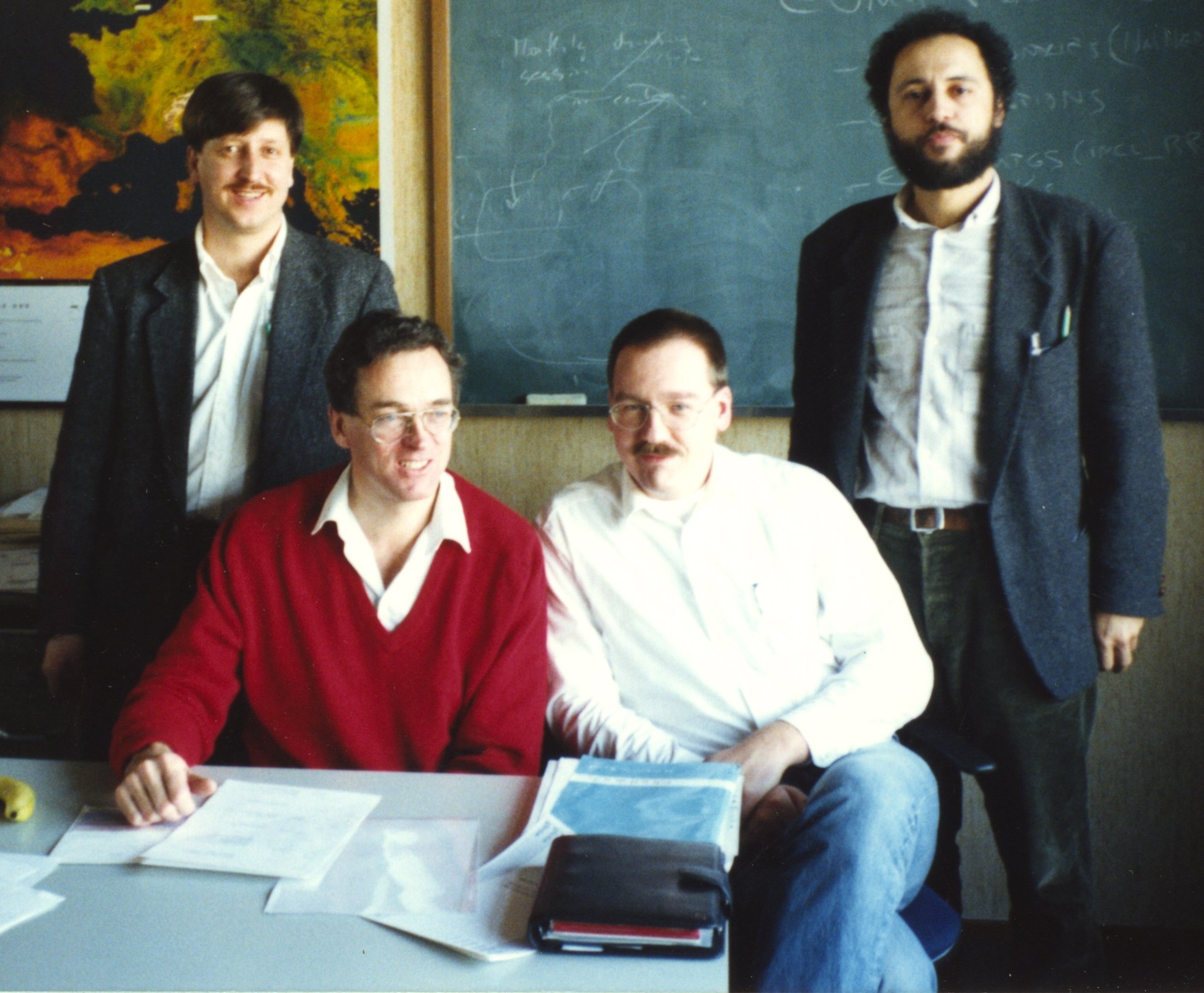|
XLINK (ISP)
XLINK originally was the eXterne Lokale Informatik-Netz Karlsruhe (the external connection of the computer science network of the universities in Karlsruhe, Germany). It was created in 1984, when it offered one of the first UUCP connections from Germany to the USA (via UUNET), and from November 1989 it also offered Internet connectivity mainly to universities in the south of Germany. XLINK was one of the founding members of RIPE and of DENIC; its autonomous system number was AS517. It was transformed into (part of) a company in 1993, and as such, competed with the UniDO ISP (incorporated as EUnet Germany) for the title of first commercial Internet service provider in Germany. It was bought by Qwest in 1999 and contributed to and renamed to KPNQwest Germany in May 2000, which went bankrupt in the Internet bubble crash of 2002. Remnants exist in KPN KPN (in full Koninklijke KPN N.V., also Royal KPN N.V.) is a Dutch landline and mobile telecommunications company. KPN originat ... [...More Info...] [...Related Items...] OR: [Wikipedia] [Google] [Baidu] |
Karlsruhe, Germany
Karlsruhe ( , , ; South Franconian: ''Kallsruh'') is the third-largest city of the German state (''Land'') of Baden-Württemberg after its capital of Stuttgart and Mannheim, and the 22nd-largest city in the nation, with 308,436 inhabitants. It is also a former capital of Baden, a historic region named after Hohenbaden Castle in the city of Baden-Baden. Located on the right bank of the Rhine near the French border, between the Mannheim/Ludwigshafen conurbation to the north and Strasbourg/Kehl to the south, Karlsruhe is Germany's legal center, being home to the Federal Constitutional Court (''Bundesverfassungsgericht''), the Federal Court of Justice (''Bundesgerichtshof'') and the Public Prosecutor General of the Federal Court of Justice (''Generalbundesanwalt beim Bundesgerichtshof''). Karlsruhe was the capital of the Margraviate of Baden-Durlach (Durlach: 1565–1718; Karlsruhe: 1718–1771), the Margraviate of Baden (1771–1803), the Electorate of Baden (1803–1806), the ... [...More Info...] [...Related Items...] OR: [Wikipedia] [Google] [Baidu] |
UUCP
UUCP is an acronym of Unix-to-Unix Copy. The term generally refers to a suite of computer programs and protocols allowing remote execution of commands and transfer of files, email and netnews between computers. A command named is one of the programs in the suite; it provides a user interface for requesting file copy operations. The UUCP suite also includes (user interface for remote command execution), (the communication program that performs the file transfers), (reports statistics on recent activity), (execute commands sent from remote machines), and (reports the UUCP name of the local system). Some versions of the suite include / (convert 8-bit binary files to 7-bit text format and vice versa). Although UUCP was originally developed on Unix in the 1970s and 1980s, and is most closely associated with Unix-like systems, UUCP implementations exist for several non-Unix-like operating systems, including DOS, OS/2, OpenVMS (for VAX hardware only), AmigaOS, classic Mac OS, an ... [...More Info...] [...Related Items...] OR: [Wikipedia] [Google] [Baidu] |
UUNET
UUNET, founded in 1987, was one of the largest Internet service providers and one of the early Tier 1 networks. It was based in Northern Virginia and was one of the first commercial Internet service providers. Today, UUNET is an internal brand of Verizon Business (formerly MCI). History Background Prior to its founding, access to Usenet and e-mail exchange from non-ARPANET sites was accomplished using a cooperative network of systems running the UUCP protocol over POTS lines. During the mid-1980s, growth of this network began to put considerable strain on the resources voluntarily provided by the larger UUCP hubs. This prompted Rick Adams, a system administrator at the Center for Seismic Studies, to explore the possibilities of providing these services commercially as a way to reduce the burden on the existing hubs. Early existence With funding in the form of a loan from Usenix, UUNET Communications Services began operations in 1987 as a non-profit corporation providing U ... [...More Info...] [...Related Items...] OR: [Wikipedia] [Google] [Baidu] |
RIPE
Réseaux IP Européens (RIPE, French for "European IP Networks") is a forum open to all parties with an interest in the technical development of the Internet. The RIPE community's objective is to ensure that the administrative and technical coordination necessary to maintain and develop the Internet continues. It is not a standards body like the Internet Engineering Task Force (IETF) and does not deal with domain names like ICANN. RIPE is not a legal entity and has no formal membership. This means that anybody who is interested in the work of RIPE can participate through mailing lists and by attending meetings. RIPE has a chair to keep an eye on work between RIPE meetings and to act as its external liaison. Rob Blokzijl, who was instrumental in the formation of RIPE, was the initial chair and remained in that position until 2014, when he appointed Hans Petter Holen as his successor. The RIPE community interacts via RIPE Mailing Lists, RIPE Working Groups, and RIPE Meetings. Alt ... [...More Info...] [...Related Items...] OR: [Wikipedia] [Google] [Baidu] |
DENIC
DENIC eG is the manager of the .de domain, the country-code top-level domain for Germany. It was founded in 1996 and is organised as a non-regulated not-for-profit cooperative. DENIC provides the Domain Name System (DNS) as well as registration and management services for .de and ENUM. Besides the whois lookup service for .de domains, its portfolio further includes DNS anycast services for registries and data escrow services for both registries and registrars of the domain industry. The DENIC Cooperative has more than 300 members, 25 percent of them based in other countries than Germany. .de domains can be registered by any individual or legal entity In law, a legal person is any person or 'thing' (less ambiguously, any legal entity) that can do the things a human person is usually able to do in law – such as enter into contracts, sue and be sued, own property, and so on. The reason for ... worldwide. Next to managing the German namespace on the Internet, DENIC is a ... [...More Info...] [...Related Items...] OR: [Wikipedia] [Google] [Baidu] |
EUnet
EUnet was a very loose collaboration of individual European UNIX sites in the 1980s that evolved into the fully commercial entity EUnet International Ltd in 1996. It was sold to Qwest in 1998. EUnet played a decisive role in the adoption of TCP/IP in Europe beginning in 1988. History The roots of EUnet, originally an abbreviation for European UNIX Network, go back to 1982 under the auspices of the EUUG (European UNIX Users Group), later EurOpen, and the first international UUCP connections.http://firstmonday.org/ojs/index.php/fm/article/view/613/534 On the Early Days of Usenet, the roots of the online cooperative culture FNET was the French branch of EUnet. Once there was a central European backbone node that was separate from the expensive telecom network, TCP/IP was adopted in place of store and forward. This enabled EUnet to connect with NSFNET in the US and with CERN’s TCP/IP connections. On January 1, 1990 EUnet began selling Internet access to non-academic customers i ... [...More Info...] [...Related Items...] OR: [Wikipedia] [Google] [Baidu] |
Qwest
Qwest Communications International, Inc. was a United States telecommunications carrier. Qwest provided local service in 14 western and midwestern U.S. states: Arizona, Colorado, Idaho, Iowa, Minnesota, Montana, Nebraska, New Mexico, North Dakota, Oregon, South Dakota, Utah, Washington, and Wyoming. On April 22, 2010, CenturyLink announced it would acquire Qwest in a stock transaction. The merger closed on April 1, 2011. Qwest began doing business as CenturyLink in August 2011. Qwest provided voice, Internet backbone data services, and digital television in some areas. It operated in three segments: Wireline Services, Wireless Services, and Other Services. The Wireline Services segment provided local voice, long-distance voice, and data and Internet (DSL) services to consumers, businesses, and wholesale customers, as well as access services to wholesale customers. The Wireless Services segment was achieved by a partnership with Verizon Wireless. Qwest also partnered with DirecT ... [...More Info...] [...Related Items...] OR: [Wikipedia] [Google] [Baidu] |
KPNQwest
KPNQwest was a telecommunications company equally owned by the Dutch national telecom operator KPN and Qwest Communications International Inc., the Internet communications company, headquartered in Denver, Colorado. The company was set to bring together the state-of-the-art fibre-optic networks of the two partners and the Internet services expertise and customer base of EUnet International. The company planned to build and operate a high-capacity European fibre optic, Internet Protocol-based network that was to span 13,000 kilometers when completed 2001. During its history of less than four years, KPNQwest created a unique, nothing-is-impossible working spirit and company culture among its 2,500 employees under the leadership of an AT&T veteran Jack McMaster. The company collapsed in a spectacular bankruptcy in 2002. The bankruptcy was largely due to the general Dot-com boom, which created highly inflated capacity demands for telecom operators. Facing this situation, many oper ... [...More Info...] [...Related Items...] OR: [Wikipedia] [Google] [Baidu] |
Internet Bubble
The dot-com bubble (dot-com boom, tech bubble, or the Internet bubble) was a stock market bubble in the late 1990s, a period of massive growth in the use and adoption of the Internet. Between 1995 and its peak in March 2000, the Nasdaq Composite stock market index rose 400%, only to fall 78% from its peak by October 2002, giving up all its gains during the bubble. During the dot-com crash, many online shopping companies, such as Pets.com, Webvan, and Boo.com, as well as several communication companies, such as Worldcom, NorthPoint Communications, and Global Crossing, failed and shut down. Some companies that survived, such as Amazon, lost large portions of their market capitalization, with Cisco Systems alone losing 80% of its stock value. Background Historically, the dot-com boom can be seen as similar to a number of other technology-inspired booms of the past including railroads in the 1840s, automobiles in the early 20th century, radio in the 1920s, television in the 194 ... [...More Info...] [...Related Items...] OR: [Wikipedia] [Google] [Baidu] |
Internet In Germany
The prevalent means of connecting to the Internet in Germany is DSL, introduced by Deutsche Telekom in 1999. Other technologies such as Cable, FTTH and FTTB (fiber), Satellite, UMTS/HSDPA (mobile) and LTE are available as alternatives. DSL In Germany, DSL is the prevalent internet access technology with over 30 million subscribers. For residential services the Annex B versions of ADSL, ADSL2+, and VDSL2 are used. With over 12 million customers the incumbent Deutsche Telekom is the market leader. Other DSL providers either operate their own hardware on local loops rented from the incumbent in a local loop unbundling (LLU) arrangement, and/or purchase bit-stream access from a provider that operates DSL hardware. The end user typically expects a TAE connector socket to connect their modem. As of January 2014, a typical monthly cost for "dual flatrate" internet and telephone service start at €25 for ADSL2+ (16 Mbit/s downlink, 1 Mbit/s uplink) and €30 for VDSL2 (50 Mbit/s downlin ... [...More Info...] [...Related Items...] OR: [Wikipedia] [Google] [Baidu] |

